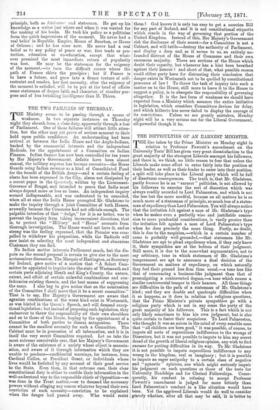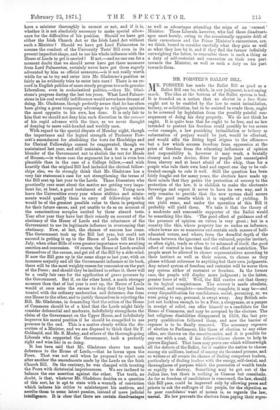THE DIFFICULTIES OF AN EARNEST MINISTER. T HE line taken by
the Prime Minister on Monday night in relation to Professor Fawcett's amendment on the University Tests' Bill has given very great dissatisfaction to the great majority of the strongest Liberals amongst his followers, and there is, we think, no little reason to fear that unless the Liberals make some effort to enter fairly into the position of their leader, as well as their leader to enter into their position. a split will take place in the Liberal party which will be full of disastrous consequences. The troth is, that Mr. Gladstone, partly because he is an " earnest " politician, is not allowed by his followers to exercise the sort of discretion which was always readily accorded to Lord Palmerston, and which is not the less but the more needful, because on all matters he is so much more of a statesman of principle, so much less of a states- man of expediency than Lord Palmerston. You will always notice that the irritation felt against a man of Mr. Gladstone's type when he makes even a perfectly wise and justifiable conces- sion to mere prudential considerations, is vastly greater than the irritation felt against a man of Lord Palmerston's type when he does precisely the same thing. Partly, no doubt, this is due to the suspicion,—which in a certain number of cases is probably well grounded,—that statesmen like Mr. Gladstone are apt to plead expediency when, if they only knew it, their sympathies are at the bottom of their judgment. Still more, it is due to the somewhat argumentative, not to say arbitrary, tone in which statesmen of Mr. Gladstone's temperament are apt to announce a final decision of the Government on matters of expediency, on which naturally they feel their ground less firm than usual,—a tone less like that of announcing a business-like judgment than that of promulgating a controverted dogma,—a tone which rouses a similar controversial temper in their hearers. All these things are difficulties in the path of a statesman of Mr. Gladstone's kind ; and they are double and quadruple difficulties when it so happens, as it does in relation to religious questions, that the Prime Minister's private sympathies go with a religious party which is not in any sense the party of the great majority of his followers. This is a fact which is not only likely sometimes to bias his own judgment, but is also quite certain to foster their suspicions. To Lord Palmerston, who thought it was an axiom in the mind of every sensible man that "all children are born good," it was possible, of course, to impute all sorts of supercilious indifference to the wrongs of Dissenters, but it was not possible to impute to him any secret dread of the growth of liberal religious opinion, any wish to find excuses for putting difficulties in its way. To Mr: Gladstone it is not possible to impute supercilious indifference to any wrong in the kingdom, real or imaginary ; but it is possible to impute an eager antipathy to a certain class of negative and "agnostic " opinions, one which might seriously impair his judgment on such questions as those of the tests for University Headships and for Clerical Fellowships. Conse- quently, his conduct in refusing to accept Professor Fawcett's amendment is judged far more bitterly than Lord Palmerston's conduct in a like situation would have been. Yet the aggrieved Liberals would do well to consider gravely whether, after all that may be said, it is better to have a minister thoroughly in earnest or not, and if it is, whether it is not absolutely necessary to make special allow- ance for the difficulties of his position. Should we have got either the Irish Church Act or the Irish Land Act without such a Minister? Should we have got Lord Palmerston to assume the conduct of the University Tests' Bill even in its present imperfect shape, and to use his whole influence with the House of Lords to get it carried ? If not,—and no one can for a moment doubt that we should never have got these measures from Lord Palmerston, certainly never have got them eagerly advocated by him as official measures,—is it not really worth while for us to try and enter into Mr. Gladstone's position as fairly as he evidently tries to enter into ours ? There is no re- cord in English politics of more steady progress towards genuine Liberalism, even in ecclesiastical politics,—than Mr. Glad- stone's progress during the last ten years. What Lord Palmer- stone in his cool worldly indifference would never have dreamt of doing, Mr. Gladstone, though perfectly aware that he has often been giving a great temporary advantage to religious opinions the most opposite to his own, has done. It is only fair to him that we should not deny him such discretion in the manner of his. rapid advance with the time, as we never thought of denying to more cold-headed and worldly men.
With regard to the special dispute of Monday night, though the importance and the logical strength of Professor Faw- cett's amendment for abolishing the tests for Headships and for Clerical Fellowships cannot be exaggerated, though we maintained last year, and still maintain, that it was a great blunder of the Government not to abolish the test for Heads of Houses,—in whose case the argument for a test is even less plausible than in the case of a College fellow,—and wish heartily that the original Bill had included the clerical fellow- ships also, we do strongly think that Mr. Gladstone has a very fair statesman's case for not strengthening the terms of the Bill sent up last year to the Lords. Those Dissenters who practically care most about the matter are getting very impa- tient for, at least, a good instalment of justice. Young men leave the Universities every year whose abilities and attain- ments would qualify them to carry off fellowships which would be of the greatest possible value to them in preparing for their future career, and yet unable to do so on account of the conscientious scruples excited by these absurd tests. Year after year they have lost their remedy on account of the obstinacy of the House of Lords and the reluctance of the Government to use its legitimate influence in overcoming that obstinacy. Now, at last, the chance of success has come. The Government took up the Bill last year, but could not succeed in getting it up to the House of Lords till the 14th July, when other Bills of even greater importance were awaiting sanction and concession. Of course, the House of Lords availed themselves of the excuse, and got rid of the Bill by a Bide-wind. If now the Bill goes up in the same shape as last year, with an immense majority and all the Government influence at its back, there will be the most weighty reason for concession on the part of the Peers ; and should they be inclined to refuse it, there will be a really fair case for the application of grave pressure by the Government. But if, on the other hand, a much stronger measure than that of last year is sent up, the House of Lords would at once seize the excuse to deny that they had been treated with the ordinary moderation and deference due from one House to the other, and to justify themselves in rejecting the Bill. Mr. Gladstone, in demanding that the action of the House of Commons should be of a kind that the Lords might fairly consider deferential and moderate, indefinitely strengthens the claim of the Government on the Upper House, and indefinitely improves his moral position if he should be compelled to use pressure in the end. This is a matter clearly within the dis- cretion of a Minister, and we are disposed to think that Sir F. Goldsmid, and Mr. S. Morley, and others of the thorough-going Liberals who supported the Government, took a perfectly right and wise line in so doing. It has been said that Mr. Gladstone shows too much deference to the House of Lords,—that he fawns upon the Peers. That was not said when he proposed to reject one after another the amendments made by the Lords on the Irish Church Bill. On the contrary, he was charged with treating the Peers with dictatorial imperiousness. We are inclined to balance the one assertion against the other. The truth, no doubt, is that, whatever Mr. Gladstone decides on a question of this sort, he is apt to state with a warmth of conviction which induces his critics to misinterpret his motives, and ascribe them to some latent passion, instead of mere judicial intelligence. It is, clear that there are certain disadvantages as well as advantages attending the reign of an `earnest' Minister. Those Liberals, however, who feel these disadvant- ages most keenly, owing to the occasionally opposite drift of their earnestness and the Prime Minister's earnestness, are, we think, bound to consider carefully what they gain as well as what they lose by it, and if they find the former infinitely outweighing the latter, to remember there is such a thing as a duty of self-restraint and concession on their own part towards the Minister, as well as such a duty on his part towards them.



































 Previous page
Previous page